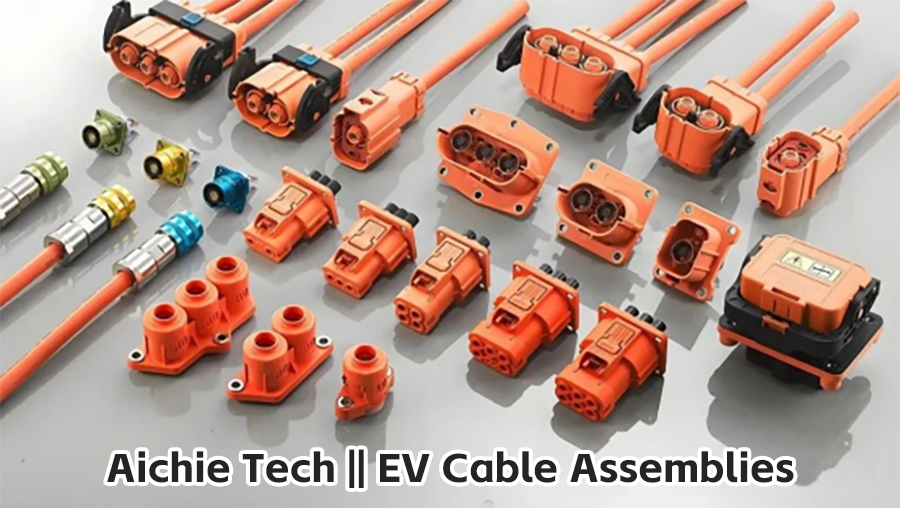Automotive connectors: Breaking Through the triple challenges of high voltage, intelligence, and cost Reduction
Amid the revolutionary wave of electrification and intelligence in the automotive industry, connectors, as the "neural network" of vehicles, are currently confronted with three core challenges: high-voltage carrying capacity, intelligent transmission, and cost control. How to break through the boundaries of technology? The industry has provided an innovative answer. Aichie Tech Electronics Co., Ltd. is also constantly adapting to the new era and continuously updating its technologies in industries such as automotive connectors and automotive wiring harnesses.

I.High Voltage Challenge: Technological Breakthrough under the 800V Platform
As 800V high-voltage platforms become standard equipment for new energy vehicles, connectors need to deal with:
1.Current-carrying capacity and heat dissipation: AVIC Optoelectronics' "aluminum instead of copper" solution, through the innovation of aluminum-based contact parts, resolves the issue of electrochemical corrosion, achieving a 20% increase in current-carrying capacity and a 20% reduction in weight.
2.Insulation safety: The application of new materials such as high-density polyethylene has enabled the insulation withstand voltage level to exceed 3000V, reducing the arc risk by 90%.
3.Lightweight integration: The one-piece terminal design reduces parts by 30%, and the aluminum alloy housing is 40% lighter than traditional copper materials.
Typical case: The connector of a certain 800V fast charging model, through a three-dimensional heat dissipation structure design, keeps the temperature rise within 35K, which is 50% better than the industry standard.
II. Intelligent Upgrade: A Transmission Revolution in the Deluma of Data
Intelligent driving has led to an average annual growth rate of 300% in in-vehicle data transmission. The connector needs to achieve:
1.High speed and stability: TE Connectivity's 0.19mm composite cable reduces signal loss to 0.5dB/m through a multi-layer shielding structure, while reducing copper usage by 60%.
2.Anti-interference design: The combination scheme of metal braided shielding layer and magnetic filter reduces EMI interference by 70dB.
3.Multi-functional integration: The new generation of composite connectors CAN simultaneously transmit 48V power, 10Gbps Ethernet signals and CAN bus instructions, with port density increased by three times.
Technological breakthrough: The Rosenberg HFM® series connectors support 24Gbps data transmission, meeting the requirements of L4-level autonomous driving sensors.
III. Cost Reduction and Efficiency Enhancement: Innovative Paths under Cost Pressure
In response to the demand from automakers for an annual reduction of 8% to 12%, the industry has adopted:
1.Material substitution: The cost of conductive plastic terminals is 40% lower than that of copper products, and their performance meets the ISO 6722 standard.
2.Technological innovation: The fully automated production line has increased per capita output by 400% and reduced the defect rate to 50PPM.
3.Design optimization: The modular connector design reduces the number of SKUs by 60% and increases the inventory turnover rate by three times.
Effectiveness comparison: Through the integrated design of the connector system, a certain car manufacturer has shortened the total length of the wiring harness by 15 meters and reduced the cost per vehicle by 200 yuan. To assist the automotive industry in integrated design, Aichie also maintains close ties with major automakers, providing one-stop customized wiring harness solutions.
IV. The Way to Break the Deadlock: Three Major Directions of Collaborative Innovation
1.Vertical integration of the industrial chain: The joint research and development cycle of material suppliers, component factories and original equipment manufacturers is shortened by 30%
2.Digital twin applications: Simulation technology reduces development trial-and-error costs by 60%
3.Co-construction of the standard system: The China Automotive Connector Standards Committee has released 12 group standards
Future Prospects
The global automotive connector market size is expected to exceed 30 billion US dollars by 2025, among which:
1.The compound annual growth rate of high-voltage connectors is 28%
2.The penetration rate of high-speed connectors has reached 65%
3.The coverage rate of lightweight solutions exceeds 80%
The industry is building a new generation of technological moats through material revolutions (graphene conductors), structural innovations (liquid metal contacts), and process breakthroughs (3D printed terminals). This "big innovation" centered on "small components" will continue to drive the automotive industry towards in-depth development towards electrification and intelligence. It also provides a historical opportunity for technology catch-up players like Aichie to change lanes and overtake. By focusing on differentiated innovation in specific scenarios, Aichie is constantly updating and learning about technological innovations in high-voltage connectors to provide reliable connections for the industrial sector.